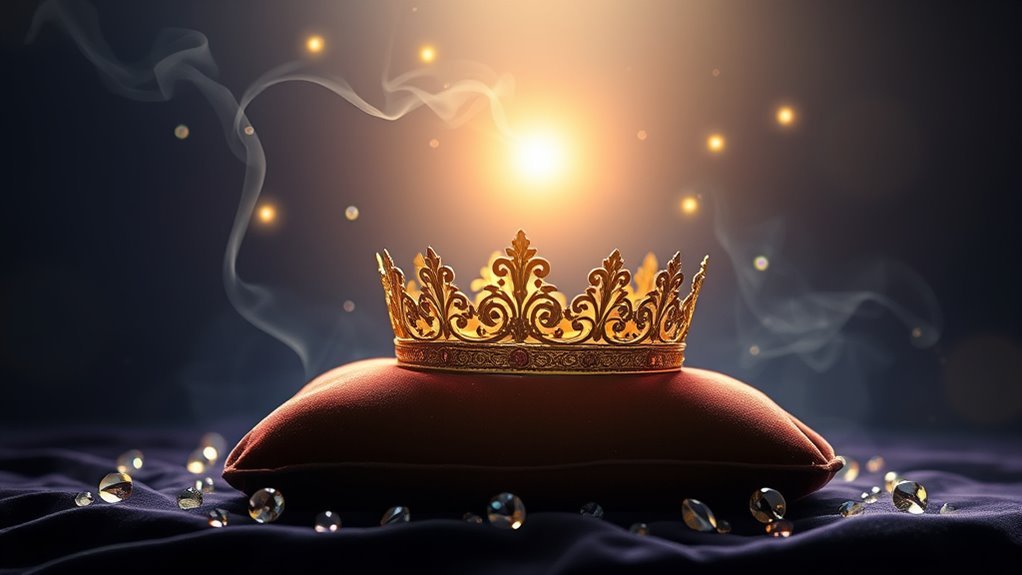Keter, meaning “crown” in Hebrew, represents the highest level of spiritual consciousness and divine connection. It embodies authority, leadership, and the essence of unity in Kabbalah, serving as a gateway to enlightenment. This concept encourages you to reflect on your potential for greatness and fosters a deeper understanding of your purpose. As you explore Keter’s significance, you’ll uncover layers of meaning that can transform your spiritual journey into something profoundly enlightening.
The Origin of the Term Keter

The term “Keter,” rooted in Hebrew, translates to “crown” and carries profound significance in various contexts. Its Hebrew origins symbolize authority, leadership, and the highest attainment of spiritual consciousness. When you explore its mystical meanings, Keter represents the pinnacle of divine connection, embodying the essence of enlightenment. This concept invites you to reflect on your own potential for greatness, urging a journey toward self-actualization and autonomy. The idea of Keter transcends mere symbolism; it speaks to the innate desire for freedom that resides within you. Understanding Keter’s origins allows you to grasp the depth of its implications, inspiring you to seek a crown of your own—one that aligns with your values, aspirations, and spiritual growth.
Keter in Kabbalah and Jewish Mysticism

Keter, as the highest of the ten sefirot in Kabbalah, embodies the divine will and the source of all creation. Its symbolism is profound, representing the initial point of consciousness that emanates the universe’s structure. When you explore keter archetypes, you’ll find they encompass the essence of unity and the purest form of existence, often linked to concepts of divine love and enlightenment. Keter invites you to understand the relationship between the infinite and the finite, allowing for a deeper comprehension of your spiritual journey. By recognizing keter’s role, you can reveal layers of meaning in your life, fostering a sense of freedom and connection to the divine source that guides all creation. Immerse yourself in this archetype, and embrace its transformative power.
The Significance of Keter in Spiritual Practices

Understanding keter’s role in Kabbalah naturally leads to its significance in various spiritual practices. Keter embodies the highest level of consciousness, serving as a gateway for spiritual ascension. When you engage with this concept, you tap into a profound divine connection that transcends ordinary existence. It encourages you to explore the depths of your soul, fostering a sense of unity with the universe.
As you investigate practices like meditation or prayer, focusing on keter can elevate your spiritual experiences, enhancing your understanding of your purpose. Embracing keter allows you to break through spiritual barriers, facilitating a journey toward enlightenment. Ultimately, recognizing its significance can profoundly transform your spiritual path, inviting deeper insights and greater freedom in your quest for truth.
Keter in Literature and Philosophy
In various literary and philosophical contexts, keter emerges as a profound symbol of ultimate reality and the pursuit of knowledge. You’ll find it woven into narratives that explore human existence, illustrating the tension between the finite and the infinite. Its literary symbolism often evokes a sense of aspiration, while its philosophical implications challenge you to confront the essence of being.
| Aspect | Description |
|---|---|
| Literary Symbolism | Represents aspiration and transcendence |
| Philosophical Implications | Challenges notions of existence and reality |
| Examples | Found in works by Plato, Dante |
| Impact | Inspires deeper understanding of self and universe |
Modern Interpretations of Keter
The concept of keter has evolved markedly in modern thought, resonating across various disciplines such as psychology, theology, and even quantum physics. In contemporary discussions, keter symbolism often reflects the pursuit of higher consciousness and self-actualization. You might find that the idea of keter consciousness embodies an awakening—a realization of your potential beyond the mundane. This exploration challenges you to break free from conventional constraints, inviting you to embrace a more profound understanding of existence. Modern interpretations also emphasize interconnectedness, suggesting that achieving keter consciousness leads to a deeper unity with others and the universe. Ultimately, this journey encourages you to redefine freedom, moving towards an enlightened state of being, where the essence of keter can be fully realized.
Frequently Asked Questions
How Is Keter Pronounced in Hebrew?
Keter is pronounced as “keh-ter” in Hebrew phonetics. The first syllable, “keh,” features a short ‘e’ sound, while the second syllable, “ter,” has a more pronounced ‘t’ and a subtle ‘er’ that can vary in accent. Understanding Keter pronunciation helps you appreciate the nuances of Hebrew. It reflects the language’s depth and beauty, inviting you to explore its meanings and the freedom it offers in expression and thought.
Are There Any Symbols Associated With Keter?
Keter symbolism is rich and profound, often juxtaposed with the chaotic nature of existence. It represents the crown, embodying divine will and the highest spiritual attainment. Its significance lies in the connection between the finite and the infinite, urging you to transcend limitations. In exploring Keter, you’ll find it’s not just a concept but a pathway to deeper understanding, inviting you to embrace freedom in your spiritual journey.
Can Keter Be Related to Other Languages?
Yes, Keter can definitely be related to other languages. In Arabic, “Keter” (كتر) often means “to increase” or “to multiply,” reflecting ideas of abundance. In Greek, while the word may not directly translate, it parallels concepts of completeness and wholeness. This linguistic connection shows how “Keter” transcends cultural boundaries, embodying notions of growth and fulfillment, inviting you to explore the deeper meanings of existence and your individual freedom within it.
What Are Some Common Misconceptions About Keter?
Some common misconceptions about keter stem from its significance in various philosophical and spiritual contexts. You might encounter keter misinterpretations that reduce it to a mere concept rather than recognizing its profound implications for enlightenment and connection to the divine. Many see it as just another term, overlooking its role in understanding higher consciousness. By exploring its deeper meanings, you can appreciate how keter reflects the pursuit of freedom and transcendence in human experience.
Is Keter Mentioned in Any Religious Texts Outside Judaism?
Keter isn’t explicitly mentioned in Christian or Islamic texts, but the concept resonates in both traditions. In Christianity, Keter can be likened to the divine crown of God’s authority and glory. In Islam, the idea of Keter finds parallels in the concept of God’s sovereignty and the highest domains of paradise. Both religions emphasize the importance of divine hierarchy and spiritual elevation, reflecting a shared pursuit of understanding the divine nature.
References
- https://en.wikipedia.org/wiki/Keter
- https://www.britannica.com/topic/keter
- https://www.jewishvirtuallibrary.org/keter
- https://www.myjewishlearning.com/article/keter-2/
- https://www.sefaria.org/Keter
- https://www.chabad.org/library/article_cdo/aid/5048120/jewish/Keter.htm
- https://www.jstor.org/stable/10.5325/jewisstudies.1.1.0001


